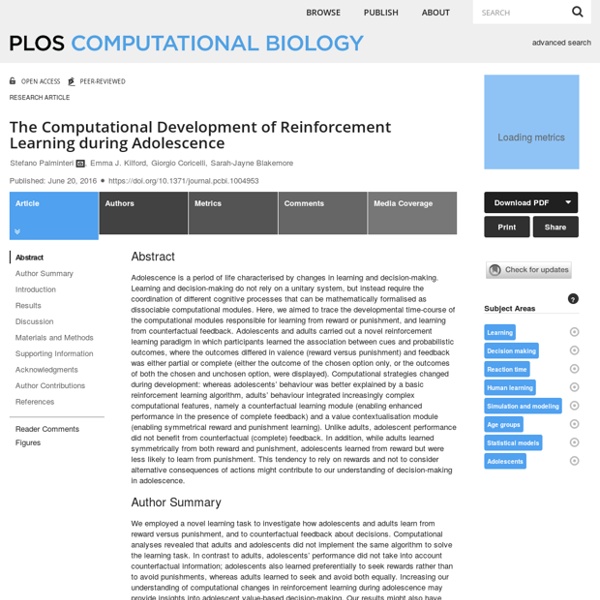Rewarding behavior is key to parenting teens, study suggests
Parenting is hard, and parenting teens brings about an entirely new set of challenges, from keeping their rooms clean to getting them home before curfew. But, a new study suggests parents who want their teenagers to keep their grades up could have better success if they focus more on rewarding good behavior and less on threatening to punish the bad. According to the report, published in PLOS Computational Biology, British researchers have found that adolescents focus well on positive incentives, but have difficulty staying motivated to avoid penalties.
Statistics on effects of adolescent rebellions
Although no parent wants to think about tough topics, like teen suicide, teen pregnancy, and teen violence, those issues are real among many of today's teenagers. It's important for parents to be informed about the issues many teenagers are facing. Even if your teen never experiences any serious problems first-hand, they'll likely have friends and classmates who do. In the next 24 hours in the United States:
Inside the mind of a teenager: A parent's guide
Photo: Getty Images 1. STOP asking “What’s wrong with you?” There’s nothing wrong with this question, if you genuinely want to know.
Tiger Mom: new study debunks punitive tiger parenting
Yale professor Amy Chua wrote “Battle Hymn of the Tiger Mother” in 2011, introducing the phrase “Tiger Mom” into popular culture and celebrating her strict parenting style. But in China, the birthplace of tiger parenting, kids whose parents control their lives with cheerless demands for perfection are becoming a problem. Researchers from UC Riverside published a new study this week, based on data from nearly 600 middle- and high-school students in Hangzhou, China, debunking the idea that punitive tiger parenting is superior. It finds that less supportive parenting techniques used by some Chinese parents damages self-esteem and complicates school adjustment, while also putting kids at greater risk of depression and problem behaviors.
How Negative Punishment Works
Negative punishment is an important concept in B. F. Skinner's theory of operant conditioning.
How Operant Conditioning Can Affect Adolescent Development
If you've ever wondered how to encourage or discourage behaviors in your adolescent or why some behaviors persist while others disappear on their own, you may benefit from understanding operant conditioning. If you've ever wondered how to encourage or discourage behaviors in your adolescent or why some behaviors persist while others disappear on their own, you may benefit from understanding operant conditioning. This type of behavior modification employs the concepts of reinforcements and punishments to promote positive behaviors and discourage negative ones. Adolescents can benefit from conditioning naturally or with your help. You can also apply it to your current parenting style as a means to aid your adolescent in adopting the behaviors necessary for his development. Description of Operant Conditioning
Tips on the Misuses of Negative Reinforcement for Parents
The website for Educate Autism explains that, “negative reinforcement occurs when something already present is removed (taken away) as a result of a person's [behavior], creating a [favorable] outcome for that person.” While negative reinforcement can be used to promote positive behaviors, parents can unintentionally perpetuate undesirable behaviors through negative reinforcement. “When thinking about reinforcement, always remember that the end result is to try to increase the behavior,” according to the website for the Chicago-area counseling firm North Shore Pediatric Therapy. Negative Reinforcement vs.
What Is Operant Conditioning and How Does It Work?
Operant conditioning, sometimes referred to as instrumental conditioning, is a method of learning that employs rewards and punishments for behavior. Through operant conditioning, an association is made between a behavior and a consequence (whether negative or positive) for that behavior.1 For example, when lab rats press a lever when a green light is on, they receive a food pellet as a reward. When they press the lever when a red light is on, they receive a mild electric shock.
10 Positive Punishment Techniques & Their Effect
By: Ashley Brown Updated February 11, 2021 Medically Reviewed By: Laura Angers As a parent, it is natural to wonder about the best way to teach your child right from wrong. Punishing them is no fun, but sometimes it has to be done if you want their behavior to change.
Developmental Psychology at Vanderbilt
Jacob Lee and Matthew Snodgress There is no one individual who influences the development of a child more than the parent. Every aspect of the child’s progression through life, beginning with their genetic makeup, is greatly influenced, if not completely determined by, the parent figure in the child’s life. Parent figures choose the climate which the child will grow up in. Whether that is in regard to family dynamics, intellectual stimulation, or social development.
Teens May Learn Best with Positive Reinforcement
A new study finds that adolescents focus on rewards and are less able to learn to avoid punishment or consider the consequences of alternative actions. University College-London investigators compared how adolescents and adults learn to make choices based on the available information. Investigators tracked the way in which 18 volunteers aged 12-17 and 20 volunteers aged 18-32 completed tasks in which they had to choose between abstract symbols.
Overjustification Effect and Motivation
The overjustification effect is a phenomenon in which being rewarded for doing something actually diminishes intrinsic motivation to perform that action. Think about a few of the things that you love to do. Is there a sport such as volleyball or basketball that you love to play? Are you passionate about knitting, reading, or collecting movie memorabilia? Normally, you engage in these activities simply for the sheer joy and pleasure of it, not for some type of outside reinforcement. The activity itself serves as its own reward.



